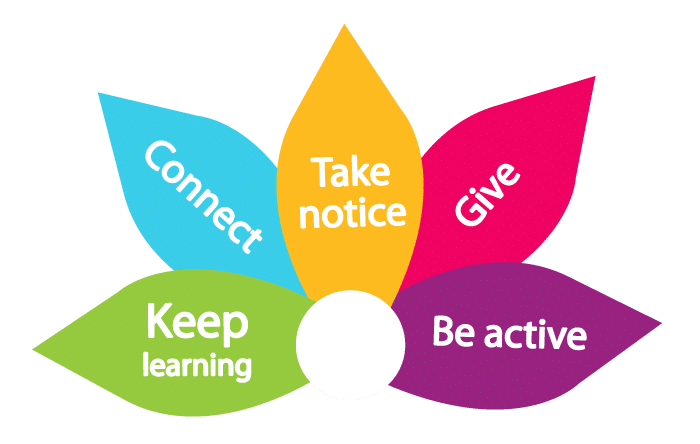
There is no consensus around a single definition of wellbeing but there is general agreement that well-being includes the presence of positive emotions and moods, the absence of negative emotions, satisfaction with life, fulfillment and positive functioning. In simple terms, well-being can be described as judging life positively and feeling good.

Tips for improving your mental wellbeing
Mental wellbeing doesn’t have one set meaning. We might use it to talk about how we feel, how well we’re coping with daily life or what feels possible at the moment.
Good mental wellbeing doesn’t mean you’re always happy or unaffected by your experiences. But poor mental wellbeing can make it more difficult to cope with daily life.
Click here to visit Minds tips for improving your mental health.

Five ways to Wellbeing
Connect…
With the people around you. With family, friends, colleagues and
neighbours. At home, work, school or in your local community. Think of
these as the cornerstones of your life and invest time in developing
them. Building these connections will support and enrich you every day.
Be active…
Go for a walk or run. Step outside. Cycle. Play a game. Garden. Dance.
Exercising makes you feel good. Most importantly, discover a physical
activity you enjoy and that suits your level of mobility and fitness.
Take notice…
Be curious. Catch sight of the beautiful. Remark on the unusual. Notice
the changing seasons. Savour the moment, whether you are walking to
work, eating lunch or talking to friends. Be aware of the world around
you and what you are feeling. Reflecting on your experiences will help
you appreciate what matters to you.
Keep learning…
Try something new. Rediscover an old interest. Sign up for that course.
Take on a different responsibility at work. Fix a bike. Learn to play an
instrument or how to cook your favourite food. Set a challenge you will
enjoy achieving. Learning new things will make you more confident as
well as being fun.
Give…
Do something nice for a friend, or a stranger. Thank someone. Smile.
Volunteer your time. Join a community group. Look out, as well as in.
Seeing yourself, and your happiness, linked to the wider community
can be incredibly rewarding and creates connections with the people
around you

Reading Well
Reading Well supports you to understand and manage your health and wellbeing using helpful reading.
Reading Well books are all recommended by health experts, as well as people with lived experience of the conditions and topics covered and their relatives and carers. You can be recommended a title by a health professional, or you can visit your local library and take a book out yourself. Click here to visit the Reading Well website for a full list of books available.

Breathing exercises for stress
This calming breathing technique for stress, anxiety and panic takes just a few minutes and can be done anywhere.
You will get the most benefit if you do it regularly, as part of your daily routine.
You can do it standing up, sitting in a chair that supports your back, or lying on a bed or yoga mat on the floor.
Make yourself as comfortable as you can. If you can, loosen any clothes that restrict your breathing.
If you’re lying down, place your arms a little bit away from your sides, with the palms up. Let your legs be straight, or bend your knees so your feet are flat on the floor.
If you’re sitting, place your arms on the chair arms.
If you’re sitting or standing, place both feet flat on the ground. Whatever position you’re in, place your feet roughly hip-width apart.
- Let your breath flow as deep down into your belly as is comfortable, without forcing it.
- Try breathing in through your nose and out through your mouth.
- Breathe in gently and regularly. Some people find it helpful to count steadily from 1 to 5. You may not be able to reach 5 at first.
- Then, without pausing or holding your breath, let it flow out gently, counting from 1 to 5 again, if you find this helpful.
- Keep doing this for 3 to 5 minutes.

Mental Wellbeing Audio Guides
The NHS has created a series of audio guides to help with boosting your mood.
You can listen to them privately, in your own time, to help you through feelings such as anxiety or a low mood.

Talk to someone about how you feel
Around one in four people in the UK experience a mental health problem each year. It’s nothing to feel ashamed about, and you are not alone. Asking for help might seem daunting or scary, but it is a step towards changing your life for the better.
There are lots of ways you can get help with your mental health. Talking to someone about how you’re feeling can help you find the right option for you.
If you’re struggling with your feelings we would suggest visiting your GP. Explain how you are feeling, and they should be able to give you some advice or even suggest treatment options.
If you feel able we’d recommend sharing how you feel with someone, this could be your friends, family, or a professional, like a trained counsellor. You could also get in contact with a mental health charity or group that offers wellbeing support. They may not be able to solve anything immediately but the simple act of talking to someone else can often help to make you feel less alone and that you have done something to get the ball rolling.

Samaritans
Following an unprecedented period of disruption and uncertainty, we know that many people have experienced trauma and poor mental health. The pandemic has widened inequalities for many people in Wales and those who were vulnerable at the beginning are now facing higher levels of distress than ever before.
At this ongoing difficult time, we are proud to launch a new resource for Wales, which is for anyone struggling to cope. This includes those who have noticed a dip in their wellbeing, those feeling lonely or isolated and those feeling suicidal. Finding your way contains some crucial information on self-harm and we are proud to have some brilliant sections from Heads above the Waves (HATW) which have a strong focus on lived experience. The resource also includes self-harm and suicide safety plans which can be lifesaving tools for those struggling to cope.
This resource has been designed as a non-clinical, accessible resource which we hope to see in a number of settings, from GPs surgeries to foodbanks, universities to job centres. Each year, between 300 and 350 people die by suicide in Wales. Many of these people are not in touch with mental health services and therefore, we know that help and signposting needs to be accessible in a wide range of priority places and frontline services. This resource is also focused on prevention and aims to help people identify when they’re struggling to cope early on, to stop them from reaching crisis point.
Download the guide here: Finding Your Way Guide
Additionally Samaritans have launched a new self help resource and ap which can be found here: Self Help
